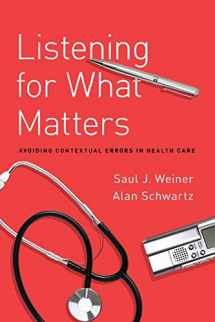
Listening for What Matters: Avoiding Contextual Errors in Health Care
Book details
Summary
Description
Effective health care requires physicians tailor care to patients' individual life contexts, including their financial situation, social support, competing responsibilities, and cognitive abilities. Physicians, however, are poorly prepared to consider patients' lives when planning their care. The result is measurably harmful to individuals and costly to society.
Listening for What Matters: Avoiding Contextual Errors in Health Care covers ten years of empirical research based on hundreds of recorded doctor visits by patients and undercover actors alike, which revealed a widespread disregard of patients' individual circumstances and needs resulting in inappropriate care. These medical errors have been largely undocumented and unaddressed by the American healthcare system.
This book tells the stories of patients whose care was compromised by inattention to individual context, and introduces novel methods for assessing the magnitude of the problem. It describes how these errors, termed "contextual errors," can be minimized through changes in how doctors are trained, how medicine is practiced and quality measured, and in the ways patients assert their needs during visits. The aim of this book is to open a dialog between patients, physicians, policy makers, and medical educators, about a serious quality problem that has been overlooked and understudied.


We would LOVE it if you could help us and other readers by reviewing the book
Book review




